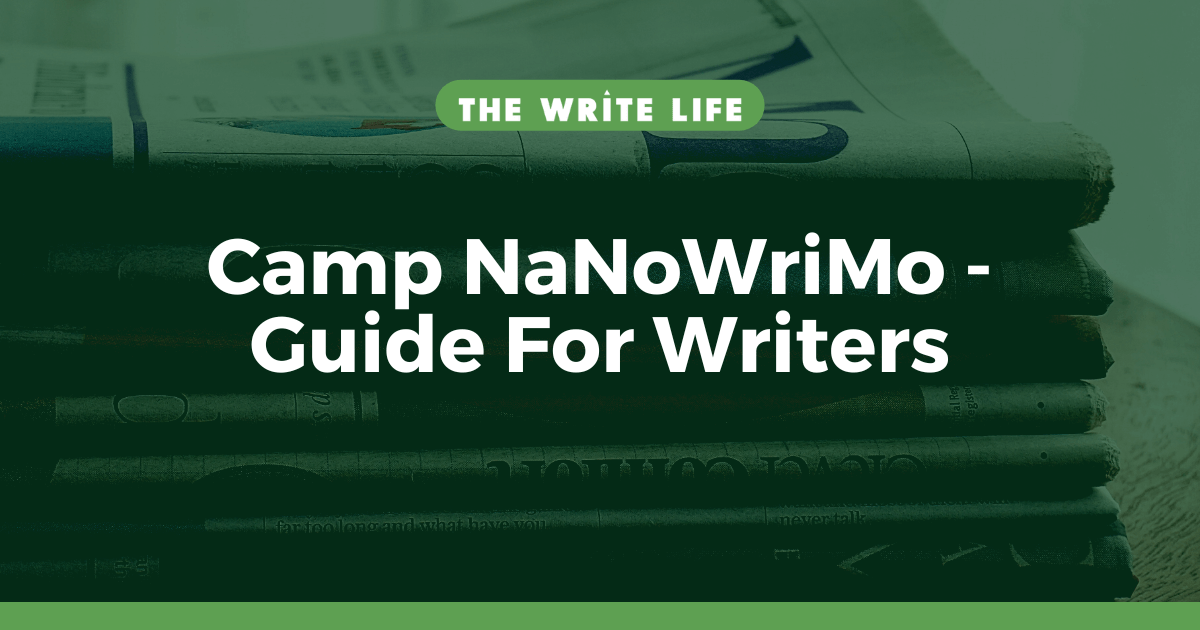If you’ve spent any amount of time in online writing circles, you’ve probably already heard of NaNoWriMo, an annual contest which challenges its participants to write fifty-thousand words during the month of November. The contest is designed specifically for novelists, but it attracts writers from all corners of the web looking to push their word count to its limit.
But NaNoWriMo isn’t the only writing contest the organization runs. Have you heard of Camp NaNoWriMo?
In this article, we’re going to talk about what Camp NaNoWriMo is, why you might be interested, how to enter, and what you can do to make the most of your Camp NaNoWriMo experience.
What Is Camp NaNoWriMo?
Camp NaNoWriMo is a writing event which takes place during the months of April and July. Like NaNoWriMo, the event lasts for the entire month. Unlike NaNoWriMo, the event does not involve writing fifty-thousand words! Also, as the name implies, Camp NaNo is more of an event than a contest—you can still win, but there isn’t as much of a competitive edge.
Let’s break down the rules for Camp NaNoWriMo:
1. The event begins at the start of the month (either April or July) and ends at the end of the month.
2. Participants can set their own word goal. This can be fifty-thousand words, but it could also be literally any other number.
3. Participants are invited to write anything. Where NaNoWriMo asks its participants to put fifty-thousand words towards, specifically, a fiction novel, Camp NaNo does not. Nonfiction, fan-fiction, memoir, poetry, grocery lists, and break-up texts are all fair game.
And that’s really all there is to it! This event is more lax compared to NaNoWriMo, and to me, that’s what makes it feel less competitive. Of course, you can technically write whatever you want for NaNoWriMo itself, and there’s no one forcing you to personally decide to write fifty-thousand words (NaNoWriMo is a self-challenge, which means you’re holding yourself accountable for meeting the goal or not).
However, the lowered expectations around Camp NaNoWriMo create a more relaxed atmosphere. It feels more like a camp, where everyone’s taking a break from their regular stuff to hang out and talk about their projects, meet other writers, and hear from published authors. Camp NaNoWriMo also boasts a host of resources for writers to learn from as they work on their projects.
Why do Camp NaNoWriMo?
Maybe you hated NaNoWriMo, and the thought of voluntarily subjecting yourself to another month of similar torture sounds asinine. First, that’s a little dramatic, but second, I think Camp NaNo is worth a shot even if NaNoWriMo didn’t work out for you. Here’s a brief list of reasons why.
1. It’s easy to participate… and to win
We’ve already talked about Camp NaNo’s comparatively lax criteria to NaNoWriMo and how that lax criteria gives the whole event a calmer feel, but I’d like to elaborate a little bit here.
First, even though participants technically can do whatever they want for NaNoWriMo, Camp NaNo means you can set your own goals without feeling left out or anything like that. There’s literally no ideal word count, and that means it’s pretty hard to rib yourself for not getting fifty-thousand words, even if you told yourself you couldn’t.
Second, participants get two different chances to participate in Camp NaNo—April and July—and that makes it more likely that you’ll be able to do it. November is a busy time of year, especially for students and teachers, and especially with the holiday season right around the corner, so it’s not always possible to drop everything and commit to a project at that time.
2. Camp NaNoWriMo’s resources can be helpful
Camp NaNo also boasts resources for writers to take advantage of while they’re working on their projects. Let’s go over two of the biggest features as listed on Camp NaNo’s website.
First, NaNoWriMo (the organization which hosts both National Novel Writing Month and Camp NaNo—don’t be confused!) hosts regular local writing events like write-ins, author q+a’s, and workshops around specific topics. Check what they’ve got going on in your area, not just during Camp NaNo, but year-round!
Here’s the Google Calendar for NaNoWriMo’s events in July, for reference:
And here’s that same month in agenda form, so you can see the specific events a little more clearly:
In addition to these local events, Camp NaNo also has Camp Counselors—these are published authors who offer support, advice, and guidance throughout the month. This was the Camp Counselor lineup for July:
The resources that Camp NaNo has to offer are great for keeping you grounded and supported throughout the process. It’s great to feel like someone’s rooting for you, and it’s awesome to have professionals to turn to for mentorship!
It’s also great to have a community surrounding your writing and the writing of other authors in your area. You might not know any other writers in your day-to-day life—this is pretty normal! It’s an oft-isolating industry, usually done alone, and usually not involving a ton of connection to other people.
And if you don’t love the idea of in-person events, guess what? Camp NaNo also has a ton of chances for online connection—their forums allow you to get in touch with local writers online and support one another as you work. You might even make some lifelong friends!
How to Make the Most of Camp NaNoWriMo
Now that you know what Camp NaNoWriMo is and why you should definitely try it out, let’s talk about how to make the most of your experience. Even if you prefer not to connect with other writers and instead do Camp NaNo totally solo, some of these tips will help you out!
1. Pick a project you’re excited about
Ultimately, you can choose to work on anything, but in my opinion, these kinds of events are best when you’re working on something that excites you. If you’ve got an idea for a book, but you just haven’t found the time to get started, guess what? The time is now! If you’ve got a weird idea for a poetry collection, bam—Camp NaNo material.
You can also use Camp NaNo to knock out a project that’s been stewing on the back burner for a while. Maybe there’s work to be done, maybe there are essays for college to be written—if it’s not something that you’re super stoked about, at least pick something that you’ll be glad you worked on.
Is there anything you shouldn’t bring to Camp NaNo, you might ask?
This is absolutely one-hundred-percent just my opinion, but I don’t like to bring established, deep-in-the-works projects to events like this. Usually I’ve already got a clear idea of where I want to go with the project, so I’m not looking for a ton of feedback, and it’s usually developed enough that there’s not a lot of exciting new stuff happening with it. I’m talking about novels that I’ve already drafted a few times, short stories that just need polishing—stuff like that.
Camp NaNo creates a ton of energy, and in that way, at least to me, it’s like rocket fuel. Some of your projects or ideas might need rocket fuel to take off and get going—some of your projects might not. You’ll be the best judge of that.
2. Use Camp NaNoWriMo to establish good writing habits
Unless you’re already writing for a living, you probably don’t write super regularly. Events like Camp NaNo might be the only months out of the year that you’re consistently returning to the keyboard for regular writing time. And that’s completely fine!
However, if you want to be a pro, you’re going to have to develop discipline. This doesn’t mean drafting everyday (in fact, it definitely does not mean drafting every day), but it does mean coming to your keyboard as consistently as you can to keep your skills honed and your story fresh.
Try finding a consistent time to work on your Camp NaNo project. You might find that you work better in the evening, or that you prefer outlining by hand, or that you prefer ten-minute writing sprints to twenty-minute writing sprints. Maybe you envisioned writing during your lunch break, but it turns out the break room at work is way too distracting—that’s good to know! Take note of what works and what doesn’t and bring that knowledge with you beyond Camp NaNo.
Of course, the option to do Camp NaNo solo is available to you. It’s a self-challenge, and as such, you’re free to keep to yourself, work on your project, and pat yourself on the back at the end of the month when you’ve completed your goals.
However, consider this: Camp NaNo is putting you in touch with other writers. Likely, some of these other writers are also readers who might be interested in reading your book when it’s published. And to be clear, I am not saying you should get close to people under the guise of friendship with the ultimate intent of selling them something—in fact, don’t.
What I am saying is that if you are self-publishing, you’re going to want to build a platform. Platforms require readers, yes, but they also require connections to other authors. Who else is publishing in your genre? What kind of stuff are they writing? Connecting to these other authors means building up your platform a little bit, and that’s going to be absolutely vital when it comes time to publish.
Additionally, working with other self-published authors is a great opportunity to compare resources. Someone might know a great editor for your genre, and someone else might have already tried the cover designer you have in mind. You can combine knowledge in this way to save yourself some time and make the best decisions possible for yourself and your work.
4. Have some fun
Here’s the thing: ultimately, Camp NaNo is meant to be fun. Going in with some kind of plan will help you optimize your experience, but if you don’t have one, I absolutely encourage you to log in on July or April 1st, set up an account, and announce a project, even if you literally just thought of it on the spot. In fact, that might be the most wholesome way to participate.
However you choose to play, have fun out there!
Have you ever done Camp NaNo? How did it compare to NaNoWriMo? Let us know in the comments!



